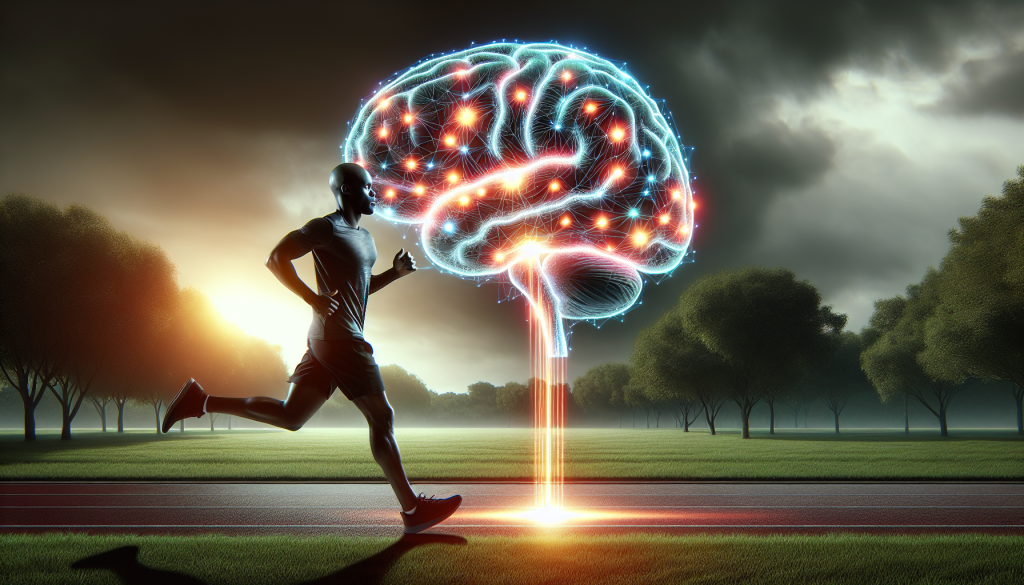Regular exercise can significantly improve your cognitive function, making your brain sharper and more efficient.
Imagine your brain as a muscle that needs regular workouts to stay in top shape.
By understanding how exercise impacts your brain, you can unlock a treasure trove of benefits that go beyond just physical health.
So, let’s dive into the fascinating world of exercise and its impact on your brain.
Key Takeaways
- Exercise enhances cognitive function by boosting memory, attention, and problem-solving skills.
- Physical activity stimulates neurogenesis, the creation of new brain cells, improving memory and learning.
- Different types of exercises like aerobic, strength, and mind-body exercises offer unique benefits for brain health.
- Consistency in exercise routines is crucial for maximizing cognitive benefits.
- Exercise can slow the progression of Alzheimer’s disease and improve quality of life for patients.
Introduction to Exercise and Cognitive Function
Definition of Cognitive Function
Cognitive function refers to the mental processes that allow us to carry out any task.
These include memory, attention, language, problem-solving, and decision-making.
Think of it as the software that runs your brain’s hardware.
Overview of Exercise Benefits
Exercise isn’t just about building muscles or losing weight.
It’s a holistic activity that benefits your entire body, including your brain.
Regular physical activity can improve mood, reduce stress, and enhance cognitive function.
Connection Between Exercise and Brain Health
Exercise increases blood flow to the brain, delivering oxygen and nutrients that help it function better.
It also stimulates the production of chemicals that promote the growth of new brain cells.
This connection between exercise and brain health is like a symphony, where each note contributes to a harmonious whole.

Exercise and Memory Enhancement
How Exercise Boosts Memory
Neurogenesis and Memory Formation
Exercise promotes neurogenesis, the process of forming new neurons in the brain.
These new neurons are crucial for memory formation and learning.
It’s like planting new seeds in a garden, allowing for fresh growth and development.
Role of Endorphins and Neurotransmitters
When you exercise, your brain releases endorphins and neurotransmitters like dopamine and serotonin.
These chemicals improve mood and enhance memory and learning.
It’s like giving your brain a natural high that boosts its performance.
Studies on Exercise and Memory Improvement
Research has shown that regular exercise can improve memory and cognitive function.
A study published in Nature found that exercise increases the size of the hippocampus, the part of the brain responsible for memory and learning.
This is like adding more storage space to your brain’s hard drive.

Acute Effects of Exercise on Cognitive Function
Impact of Exercise Intensity
Comparison of Low vs. High-Intensity Exercise
Both low and high-intensity exercises have their benefits.
Low-intensity exercises like walking can improve mood and reduce stress, while high-intensity workouts can boost cognitive function and memory.
It’s like choosing between a gentle stroll and a thrilling roller coaster ride.
Immediate Cognitive Benefits Post-Exercise
After a workout, you might notice a boost in your mental clarity and focus.
This is because exercise increases blood flow to the brain, providing it with the oxygen and nutrients it needs to function optimally.
It’s like giving your brain a refreshing splash of cold water.
Resistance Exercise and Cognitive Function
Resistance exercises, like weightlifting, can also improve cognitive function.
They increase the production of growth factors that promote brain health and neuroplasticity.
It’s like building a stronger foundation for your brain’s architecture.

Optimal Exercises for Brain Health
Aerobic Exercises
Walking, Running, and Cycling
Aerobic exercises like walking, running, and cycling are great for brain health.
They increase blood flow to the brain and promote the release of brain-derived neurotrophic factor (BDNF), a protein that supports brain health.
It’s like giving your brain a breath of fresh air.
Benefits of Swimming
Swimming is another excellent aerobic exercise that benefits the brain.
It combines physical activity with relaxation, reducing stress and improving mood.
It’s like a soothing balm for your brain.
Strength Training
Strength training exercises, like lifting weights, can also benefit your brain.
They increase the production of hormones that promote brain health and improve cognitive function.
It’s like fortifying your brain’s defenses.
Mind-Body Exercises
Yoga and Tai Chi
Mind-body exercises like yoga and Tai Chi combine physical movement with mental focus, improving cognitive function and reducing stress.
It’s like a meditation in motion.
Meditation and Cognitive Benefits
Meditation can enhance cognitive function by improving attention, memory, and emotional regulation.
It’s like giving your brain a mental massage.

Maximizing Brain Benefits from Exercise
Consistency and Routine
Consistency is key when it comes to reaping the cognitive benefits of exercise.
Regular physical activity helps maintain brain health and improve cognitive function over time.
It’s like watering a plant regularly to keep it thriving.
Combining Physical and Mental Activities
Combining physical and mental activities, like dancing or playing sports, can enhance cognitive function.
These activities challenge your brain and body, keeping them both sharp.
It’s like a two-for-one deal for your brain.
Importance of Outdoor Exercise
Benefits of Nature on Mental Health
Exercising outdoors can have additional benefits for your brain.
Nature has a calming effect on the mind, reducing stress and improving mood.
It’s like a natural antidepressant.
Enhanced Cognitive Function from Outdoor Activities
Outdoor activities like hiking or cycling can improve cognitive function by providing a change of scenery and stimulating the senses.
It’s like giving your brain a mini-vacation.
Exercise and Cognitive Function in Alzheimer’s Disease
Systematic Review and Meta-Analysis Findings
Research has shown that exercise can slow the progression of Alzheimer’s disease and improve cognitive function in patients.
A systematic review found that regular physical activity can improve memory and cognitive function in Alzheimer’s patients.
It’s like giving them a lifeline to better brain health.
Types of Exercises Beneficial for Alzheimer’s Patients
Aerobic exercises, strength training, and mind-body exercises can all benefit Alzheimer’s patients.
These exercises improve brain health and slow the progression of the disease.
It’s like a multi-pronged approach to fighting Alzheimer’s.
Long-term Cognitive Benefits and Disease Progression
Regular exercise can provide long-term cognitive benefits for Alzheimer’s patients, slowing disease progression and improving quality of life.
It’s like adding more time to their cognitive clock.

Conclusion
Summary of Key Points
Regular exercise can significantly improve cognitive function by boosting memory, attention, and problem-solving skills.
Different types of exercises offer unique benefits for brain health, and consistency is key to maximizing these benefits.
Encouragement for Regular Exercise
So, lace up your sneakers and get moving!
Whether it’s a brisk walk, a yoga session, or a swim, every bit of exercise counts towards better brain health.
It’s like investing in your brain’s future.
Future Research Directions in Exercise and Cognitive Health
As we continue to explore the connection between exercise and cognitive health, future research will uncover even more ways to optimize brain function through physical activity.
It’s like opening a new chapter in the book of brain health.
For more insights on how regular physical activity can improve cognitive function, check out this article from Harvard Health.
And if you’re curious about how exercise can boost your mood, take a look at this resource.
Unlocking the Mind: FAQ on The Impact of Regular Exercise on Cognitive Function
How does regular exercise benefit cognitive function?
Regular exercise enhances cognitive function by increasing blood flow to the brain, which promotes the growth of new brain cells and improves overall brain health. It also helps in reducing inflammation and insulin resistance, which are factors that can negatively impact cognitive abilities.
What types of exercise are most effective for cognitive improvement?
Aerobic exercises like walking, cycling, and swimming are particularly effective in boosting cognitive function. These activities increase heart rate, which improves blood circulation to the brain. Strength training and flexibility exercises can also contribute to cognitive health by reducing stress and improving mood.
Can exercise help prevent cognitive decline in older adults?
Yes, regular physical activity is associated with a lower risk of cognitive decline in older adults. Exercise helps maintain brain plasticity, which is crucial for learning and memory. It can also delay the onset of neurodegenerative diseases such as Alzheimer’s by keeping the brain active and healthy.
How often should one exercise to see cognitive benefits?
To reap cognitive benefits, it is recommended to engage in moderate-intensity exercise for at least 150 minutes per week, which can be broken down into 30-minute sessions five times a week. Consistency is key, so finding a routine that fits your lifestyle is important.
Are there any immediate cognitive benefits from exercising?
Yes, even a single session of exercise can lead to immediate improvements in cognitive functions such as attention, processing speed, and executive function. This is due to the increased blood flow and the release of endorphins, which enhance mood and cognitive performance.
Does exercise impact mental health and cognitive function differently?
While exercise benefits both mental health and cognitive function, the mechanisms differ. Exercise reduces symptoms of anxiety and depression by releasing endorphins and improving mood, while cognitive benefits are primarily due to enhanced brain plasticity and improved blood flow to the brain.
Can exercise improve cognitive function in children and adolescents?
Yes, regular physical activity is crucial for the cognitive development of children and adolescents. Exercise improves concentration, memory, and classroom behavior, which can lead to better academic performance. It also fosters a healthy lifestyle that can benefit cognitive function in the long term.
Is there a link between exercise and creativity?
Exercise can indeed boost creativity by enhancing divergent and convergent thinking, which are essential for creative problem-solving. Physical activity increases the production of neurotransmitters that promote brain plasticity, leading to improved creative thinking.
How does exercise affect brain structure?
Regular exercise can lead to structural changes in the brain, such as increased volume in areas associated with memory and executive function. It also promotes the growth of new neurons and strengthens connections between existing ones, enhancing overall brain function.
Are there any risks associated with exercising for cognitive benefits?
While exercise is generally beneficial, over-exercising or engaging in high-intensity workouts without proper guidance can lead to physical injuries or mental fatigue. It’s important to balance exercise with rest and recovery to ensure optimal cognitive and physical health.



